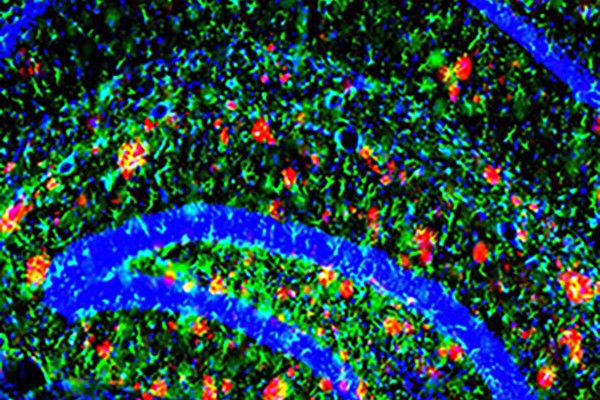Brain’s ability to dispose of key Alzheimer’s protein drops dramatically with age
The greatest risk factor for Alzheimer’s disease is advancing age. Researchers at Washington University School of Medicine in St. Louis have identified some of the key changes in the aging brain that lead to the increased risk. The changes center on amyloid beta 42,
a main ingredient of Alzheimer’s brain plaques.
Bateman receives MetLife Award for Alzheimer’s research
Randall J. Bateman, MD, the Charles F. and Joanne
Knight Distinguished Professor of Neurology at the
School of Medicine, has received a MetLife Foundation Award
for Medical Research. Bateman, a leader in Alzheimer’s disease research, is the university’s fifth researcher to receive the prize.
Medical Campus leaders stress need for research funding to congresswoman
U.S. Rep. Vicky Hartzler, R-Harrisonville, visited the School of Medicine on Wednesday to learn about research taking place on the Medical Campus and to hear campus leaders’ thoughts on the need for research funding. The congresswoman is a member of the House Armed Services Committee and the House Committee on the Budget.
Scientists find new link between diabetes and Alzheimer’s
Researchers have uncovered a unique connection between
diabetes and Alzheimer’s disease, providing further evidence that a
disease that robs people of their memories may be affected by elevated blood sugar, according to scientists at
Washington University School of Medicine in St. Louis.
Brain cell activity regulates Alzheimer’s protein
Increased brain cell activity boosts brain fluid levels of a protein linked to Alzheimer’s disease, according to new research
from scientists at the School of Medicine. Senior author David M. Holtzman, MD, said the findings should help advance efforts to treat Alzheimer’s and other neurodegenerative disorders associated with the tau protein.
Holtzman, Bateman win Chancellor’s Innovation Award
David M. Holtzman, MD, and Randall J. Bateman, MD, have been chosen as co-recipients of the Chancellor’s Award for Innovation and Entrepreneurship at Washington University in St. Louis.
Sleep loss precedes Alzheimer’s symptoms
Sleep is disrupted in people who likely have early
Alzheimer’s disease but do not yet have the memory loss or other
cognitive problems characteristic of full-blown disease, researchers at
the School of Medicine report. Shown is first author of the study, Yo-El Ju, MD, an assistant professor of neurology.
Alzheimer’s plaques disrupt brain networks
Scientists studying the way Alzheimer’s disease takes root in
the brain have identified important new similarities between a mouse
model and human Alzheimer’s. Researchers at Washington University School of Medicine in St. Louis
have shown that brain plaques in mice are associated with disruption of
the ability of brain regions to network with each other.
Alzheimer’s protein detected in brain fluid of healthy mice
One of the most promising markers of Alzheimer’s disease, previously thought only to be inside nerve cells, now appears to be normally released from nerve cells throughout life, according to researchers at Washington University School of Medicine in St. Louis.

